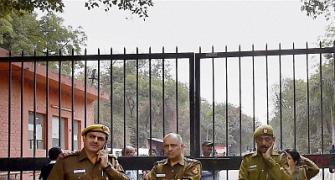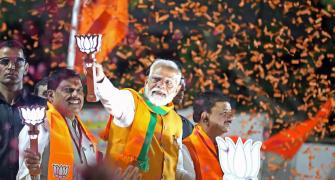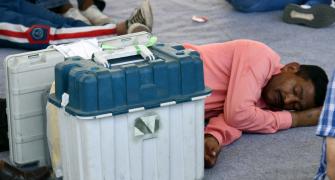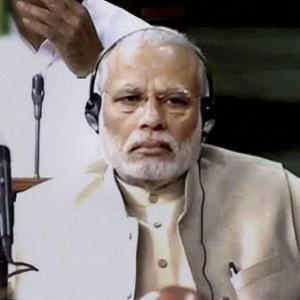The primary problem is that India's garment factories are too small and they typically have 150 people and about 80 machines, says Rahul Jacob.

Photograph: Reuters
When a well-known international sports brand approached Nagesh Sharma, who runs an apparel sourcing company from Gurgaon, with a huge order for tracksuit pants, Mr Sharma tried to source the product from India.
He found only one apparel factory could match the buyer's specifications.
The primary problem, Mr Sharma says, is that India's garment factories are too small; they typically have 150 people and about 80 machines.
The average factory in Bangladesh has 600 people. Mr Sharma eventually sourced the order from a Taiwanese-owned factory in the Kenyan city of Mombasa, which produces nine million garments annually.
Mr Sharma's recent sourcing experience is an emblematic tale of missed opportunities for India's apparel industry, throttled by the country's labour laws, tedious customs clearance routines and other government-made "Only in India" regulations.
For calendar year 2015, garment exports from Bangladesh to the US grew 12 per cent to $5.4 billion.
Vietnam did even better, growing 14 per cent to $10.6 bn. In 2015, India's apparel exports to the US grew just eight per cent to $3.4 bn.
Much has already been said about this week's over-praised Budget. The assumptions of a hefty jump in government receipts from taxes and disinvestment may well prove optimistic, but that is a time-proven tenet of what might be called Indian government accepted accounting principles.
What can be said with certainty is that the government's claim that farmer's incomes will double, ie, grow at close to 15 per cent annually, is a cruel joke.
Given that agriculture has inched ahead at about 1.5 per cent annually for the past couple of years and two-thirds of farmers hold less than a hectare, one can expect millions more to leave farming in search of genuinely remunerative work. The question remains: will there be factory jobs for them?
The likely place to find them would be labour-intensive industries such as apparel. But, for the garment manufacturers in Gurgaon and Tirupur, the echo chamber of Lutyen's Delhi is another world.
The tiny cut in duty on imported fabric for garments destined for exports in the budget, says Milton John, managing director of Cotton Blossom, a company based in Tirupur in Tamil Nadu that supplies to Marks & Spencer, Next and Mothercare, is little more than "a conversation point."
He describes the Budget as "very disappointing…after agriculture, the maximum people could be employed in the textile industry."
Mr John praises the government's initiatives to push skilling down to the factory level instead of relying on non-governmental organisations, but worries that the government is doing too little to address a global trend in garment buying that is going against India.
As the popularity of garments made from man-made fibres rises exponentially, especially in stores like Uniqlo and H&M, India's comparative advantage as a cotton producer has less relevance.
China dominates the manufacture of man-made fibre, but hefty duties on such imports leaves producers such as Cotton Blossom heavily reliant for poly cottons on the high priced products of Reliance Industries.
Since fabric usually accounts for 60 per cent of the garment's cost, this is a deal-breaker for companies pitching for the business of European and US retailers.
Mr Sharma blames India's tardy customs clearance at its ports and a banking system geared for the big guys (and big defaulters), which is unable to compute that a large order from Macy's, for instance, means a small business owner is credit-worthy.
In Bangladesh, he says, deferred payments from retailers are taken into account when giving loans. The industry in Sri Lanka and Bangladesh has thus been a foundation for many people of modest means to make good.
Though efficiency at Indian ports has improved, it massively lags behind those in China, which accounts for seven of the world's largest ports. Mumbai comes in the thirties, with little more than a tenth of shipments of 37 million TEUs (twenty-foot equivalent) from the port in Shanghai, China's commercial capital.
Mr Sharma, whose sourcing business from all over the developing world gives him a good vantage point, says the high volumes passing through Chinese ports have resulted in a speedy, laissez faire approach.
"The volumes are so high they do not start out thinking you are a crook," he says. "Here, it is exactly the opposite." This leads to companies like his padding delivery times to allow for delays at customs and clearance at ports - and an Indian supplier often losing an order.
"You can price yourself out or you can time yourself out," Mr Sharma says.
If the end of the advantages for Indian textiles that accrued with the phasing out of multi-fibre agreement quotas in 2005 were a heavy blow, the inclusion of countries such as Vietnam in the Trans Pacific Partnership promises to make India's attempts to benefit from the rise in China's labour costs an uphill battle.
The silks and cottons of Murshidabad may have attracted the attention of Robert Clive and other rapacious traders in the 18th century, but today Mr Sharma says the world would scarcely notice if India stopped exporting apparel.
Two years ago, Ranjan Mahtani, whose company, Epic Group, is the largest exporter of cotton casual trousers to the US, was musing about opening his first factory in India - but the company, which employs more than 20,000 workers in Bangladesh and Vietnam, opted for another new factory near Ho Chi Minh City instead.
In an ironic twist, Mr Sharma is now planning to take advantage of free trade agreements India is part of to source apparel from Bangladesh and Vietnam for Indian retailers.










